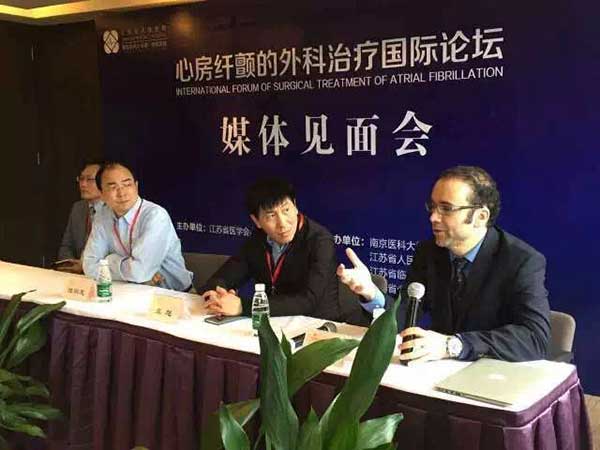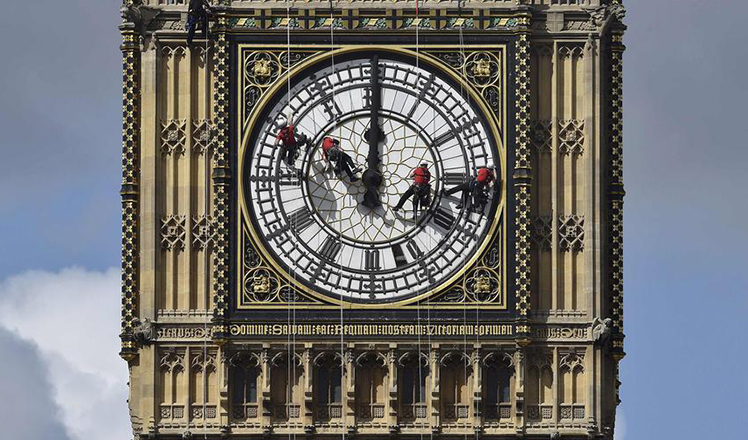Experts recommend coordinated care for cardiac patients
Updated: 2016-04-28 19:02
By Shan Juan(chinadaily.com.cn)
|
||||||||
|
 |
|
Professpr Ali Khoynezhad with Cedars Sinai Hospital in Los Angeles, US answers question from the press at the meeting.[Photo by Shan Juan/chinadaily.com.cn] |
A widespread lack of collaboration between the surgical and internal medicine departments at Chinese hospitals makes it difficult for patients with irregular heart beats to receive the best available medical treatment, top heart specialists said.
Experts delivered the message at a symposium on a minimally invasive surgical procedure known as mini-maze that is used to treat atrial fibrillation. Irregular and rapid heart rates, the hallmarks of atrial fibrillation, can increase the risk of stroke, heart failure and other heart-related complications, medical experts said.
The meeting was organized by the First Affiliated Hospital with Nanjing Medical University, Jiangsu province Hospital in Nanjing, capital city of east Jiangsu province.
China has about 10 million patients needing treatment for atrial fibrillation and the disease is on quick rise in the rapidly aging country, said Shao Yongfeng, head of the hospital's department of cardiac surgery.
The risk increases with age. About 1 percent of those aged 60 and older have the disease, and the number rises to 10 percent for those aged 75 and older, he said.
Meng Xu, a well-known cardiologist at Anzhen Hospital in Beijing, said the number of patients with the disease may increase dramatically over the next 40 years because of China's rapidly aging population.
Worldwide, the mini-maze surgical procedure has been widely used to cure atrial fibrillation and treat patients with a history of the cerebral infarction, an ischemic stroke that results from a blockage in the blood vessels supplying blood to the brain, Shao said.
"It's safe and effective for the patients," he said.
However, in China, a majority of the atrial fibrillation patents are referred to internal medicine departments that recommend radio-frequency ablation, a nonsurgical procedure used to treat some types of rapid heart beating.
"Only 3 percent of the Chinese patients would land the mini-maze, which is a more efficient cure," Meng said.
Ali Khoynezhad, a heart surgeon at the famed Cedars Sinai Hospital in Los Angeles, said patients at his hospital are evaluated jointly by physicians of both the surgical and the internal medicine departments. More than 30 percent of the atrial fibrillation patients typically receive the mini-maze, he said.
Meng said financial concerns are another barrier for a wider use of the operation in China, as the surgery is currently not covered by public insurance policies. Few Chinese buy commercial health insurance policies that might cover the surgery.
- DPRK's Musudan missile launch appears to have failed
- No one can be impeached for being unpopular: Rousseff
- Cruz teams up with Fiorina against Trump in GOP race
- Russia launches rocket from newly-built Vostochny Cosmodrome
- Iraqi parliament approves partial cabinet reshuffle
- S. Korea, US sign space cooperation agreement

 Top 10 dazzling new car models at Beijing auto show
Top 10 dazzling new car models at Beijing auto show
 London's Big Ben to fall silent for urgent repairs
London's Big Ben to fall silent for urgent repairs
 Rare snub-nosed monkeys at Beijing Zoo
Rare snub-nosed monkeys at Beijing Zoo
 Human-like robots say 'hi' to President Xi
Human-like robots say 'hi' to President Xi
 Animals turn savvy earners from entertainers
Animals turn savvy earners from entertainers
 Slackline walker conquers Tiger Jumping Gorge
Slackline walker conquers Tiger Jumping Gorge
 Top 6 domestic new-energy vehicles at Beijing auto show
Top 6 domestic new-energy vehicles at Beijing auto show
 30th anniversary of the Chernobyl nuclear disaster marked
30th anniversary of the Chernobyl nuclear disaster marked
Most Viewed
Editor's Picks

|

|

|

|

|

|
Today's Top News
Liang avoids jail in shooting death
China's finance minister addresses ratings downgrade
Duke alumni visit Chinese Embassy
Marriott unlikely to top Anbang offer for Starwood: Observers
Chinese biopharma debuts on Nasdaq
What ends Jeb Bush's White House hopes
Investigation for Nicolas's campaign
Will US-ASEAN meeting be good for region?
US Weekly

|

|







